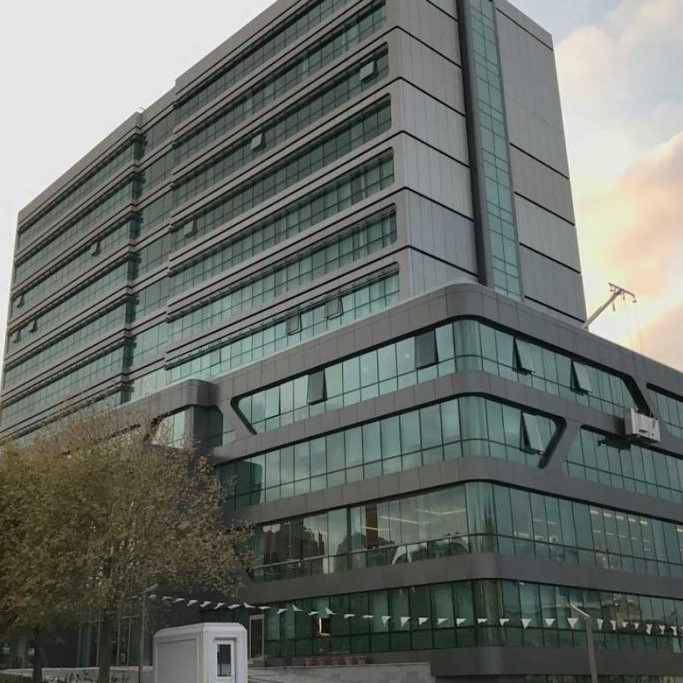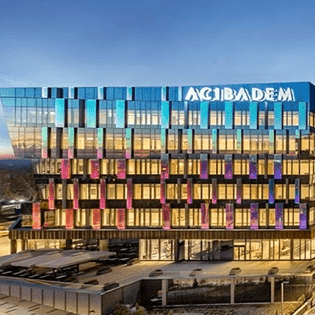Glioma
Brain tumors are divided into two groups: benign and malignant. Not every tumor is malignant or lethal. However, in tumors occurring in the brain; Even if the tumor is benign, it can be dangerous because it remains closed within the skull. For this reason, even if the brain tumor is benign, it should be monitored and kept under control.
What are the Symptoms of Brain Tumor?
Brain tumor symptoms vary from case to case. The brain manages our entire body. There are different parts of the brain, and these regions enable many of our skills such as speaking, hearing, moving, seeing and remembering. The symptoms of the problem vary depending on the location of the tumor. However, the most common symptoms we encounter in brain tumors are as follows:
Headache: As the tumor grows, it increases intracranial pressure. It causes headache. This headache is different from the headaches we all experience periodically. It does not respond to painkillers, it is constant, it gets worse at night and the pain continues when you wake up in the morning. The pain gets worse when you cough or sneeze.
Nausea and Vomiting: Nausea and vomiting are one of the most common complaints in brain tumors. It is usually seen together with headache.
Numbness: The growing tumor puts pressure on the brain tissue. This pressure manifests itself in the person as drowsiness and constant sleepiness.
Visual Disorders: Sudden visual disturbances (double vision, image fluctuation, blurred vision, etc.) are an important reason for us to suspect brain tumors. The patient's brain MRI must be checked.
Speech-Comprehension-Memory Problems: Depending on the location of the tumor, a person with a brain tumor may experience different problems such as inability to turn the tongue, inability to remember words, difficulty in pronunciation, lisping, and inability to understand what is spoken.
Seizure: As we mentioned, the tumor puts pressure on the brain tissue. Some brain cells begin to lose their natural position. As a result, tremors may occur in arms, legs and even the whole body. Sudden loss of consciousness may be observed.
Balance Problems: Having difficulty in standing up or walking may be a symptom of different health problems. Brain tumor is one of these diseases. A person with a brain tumor may have difficulty balancing, walking, or standing.
Personality Change: Changes in the person's behavior and attitudes can be observed depending on the area where the tumor is located. Some of the changes observed include suddenly becoming introverted, not paying attention to the environment, being quieter than usual, and sometimes becoming more cheerful or irritable.
What Causes Brain Tumor?
What causes brain tumor is a question that many of our patients wonder about. It is thought that there are some risk factors that trigger tumor formation. The following answers can be given to the question of what causes brain tumor. Aging, a family history of cancer or brain disease, being a white person, stressful life, constant sleep deprivation, cumbersome brain, exposure to radiation, and unhealthy diet are some of these risks. These factors do not directly affect tumor formation, but they have the potential to harm our brain. One of these possible damages is brain tumors.
The gold standard in brain tumor diagnosis is MRI technology. In MRI imaging, the presence, location and volume of the tumor are detected. Treatment and, if necessary, surgery are planned according to this information.
Types of Brain Tumors
Glial Tumors
The American National Brain Tumor Society stated that there are more than 120 different types of brain tumors. Gliomas arising from glial cells also have an important place among all brain tumors. Glial cells, together with neurons, form our nervous system. They are the tissues that surround and support the neurons in our brain. They are not nerve cells. They do not produce electrical signals like neurons. However, it has important contributions to the nervous system.
The number of glial cells is almost the same as the number of neurons in the brain, and unlike neurons, they multiply throughout life by dividing by mitosis. That's it, tumors that form in glial cells are called gliomas. Gliomas are the most common type of tumor we see in the brain. They tend to multiply uncontrollably. Glial tumors are usually malignant. Almost 80% of malignant tumors are glial tumors. Glial tumors are divided into many headings and subheadings. These tumor types can be stage 1, 2, 3 and 4 tumors.
Grade 1 tumors are benign, grow more slowly, and rarely recur. However, although some glial cell tumors may initially appear to be stage 1 (diffuse tumors), there is a risk of progression and deterioration.
Grade 2 tumors are neither benign nor malignant. They appear benign at first, but they tend to become malignant over time. There is a risk of spread and recurrence.
Grade 3 tumors are malignant. There is a high risk of it growing and spreading to its surroundings.
Grade 4 tumors are advanced-stage malignant brain tumors. Glioblastoma multiforme is the most malignant brain tumor known.
Brain Tumor Treatment
Brain tumor treatment is a treatment that can be individually determined. The main purpose of brain tumor treatment is to extend the life of the patient by preserving the quality of life. Factors such as tumor type, diameter, location, and general condition play a determining role in brain tumor surgery. Therefore, treatment is personalized and the likelihood of success increases. The chance of treatment increases in the first and second stages of brain tumor. At these stages, the tumor is surgically removed and additional radiotherapy treatment is applied. The tumor in the third stage progresses faster. Therefore, the possibility of treatment decreases. The fourth stage of brain tumor is the most dangerous stage. Surgical intervention is generally not possible for these types of patients due to the spread of the tumor. Radiotherapy and chemotherapy treatment is applied to these types of patients. Malignant brain tumors are usually treated with surgery. The aim is to completely remove the brain tumor while preserving healthy brain tissue.
What is awake brain tumor surgery?
Awake brain tumor surgery, as the name suggests, is a procedure that allows the patient to be awake during the surgery and, accordingly, important functions such as speech and arm and leg movements can be monitored during the surgery, thus aiming to minimize risks such as postoperative speech impairment and paralysis. is the method. This procedure can be performed on brain tumors in any location, depending on the relevant function.
In which diseases is awake brain tumor surgery used?
In modern neurosurgery practices, awake brain tumor surgeries are currently the method used in the surgery of brain tumors located in the speech center of the brain. Because the need to perform awake tumor surgery in surgery for tumors in other regions is no longer necessary, thanks to the modern technologies available. Because the neurological functions of that area can be monitored even while the patient is sleeping. However, if the tumor location is in the speech center, it becomes a necessity to perform awake brain tumor surgery since it is not possible to monitor it during surgery under general anesthesia with the available technologies.
How is awake brain tumor surgery performed?
There are several ways to perform world-class awake brain tumor surgery today. In awake brain tumor surgery, which is performed in our country and is now accepted in the world, during the surgery, before the tumor removal process begins, the patient's speech cortex, that is, the part of the brain related to speech, is mapped using the method called brain mapping and speech arrest. The area that will not affect the speech or will affect it the least is selected. During tumor removal, the patient's speech functions are constantly monitored throughout the surgery. At the same time, in addition to this technology, the method called yellow-560 tumor staining separates the tumor tissue from normal tissues, and the risk of the patient's postoperative speech impairment is reduced to less than 1%.
After Brain Surgery
Patients may feel uncomfortable after brain surgery. The cause of this disorder is the pain in the head due to edema caused by a tumor in the brain. However, these pains begin to decrease a few days after the operation and the patient feels more comfortable and better. After brain surgery, patients may experience headaches, dizziness, double vision problems, fatigue, and numbness in some parts of the body. The patient also needs to use some medications. These medications may have side effects such as appetite changes or feeling sleepy. Hospital stay varies depending on the surgery. After being discharged from the hospital, the patient usually rests at home for 2 weeks. The stitches are removed 2 weeks after the surgery, and the first check is made in the first month. Subsequent checks are performed at 3rd, 6th and 12th months. Control times may vary depending on the surgery. A diet rich in protein is required after surgery. Natural, fresh and fiber-rich foods should be consumed and plenty of water should be drunk. The surgical site should not be wet for the first few days after the surgery, but bathing can be done while protecting the surgical site. After the surgery, you should not smoke until the wound is completely healed.
Free Consultation!



















